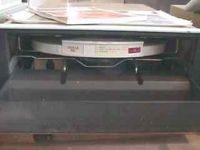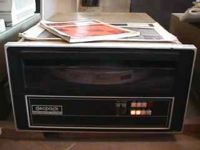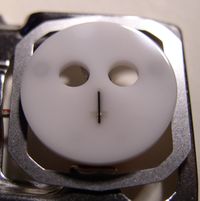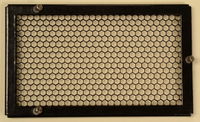Difference between revisions of "RK05 disk drive"
(Initial pass at increasing content) |
m (+New cat) |
||
| (22 intermediate revisions by the same user not shown) | |||
| Line 2: | Line 2: | ||
| name = RK05 | | name = RK05 | ||
| manufacturer = [[Digital Equipment Corporation]] | | manufacturer = [[Digital Equipment Corporation]] | ||
| + | | controller = [[RK8E]] ([[Omnibus]])<br>[[RK11|RK11-D]] ([[UNIBUS]])<br>[[RK11|RKV11-D]] ([[QBUS]]) | ||
| capacity = 2.45 Mbytes (most versions) | | capacity = 2.45 Mbytes (most versions) | ||
| − | | | + | | transfer rate = 102 Kword/sec (RK8E)<br>90.1 Kword/sec (RK11) |
| + | | average access time = 70 msec | ||
| rpm = 1500 | | rpm = 1500 | ||
| + | | revolution time = 20 msec | ||
| + | | one track seek = 10 msec | ||
| + | | average seek = 50 msec | ||
| + | | maximum seek = 85 msec | ||
| surfaces = 2 | | surfaces = 2 | ||
| − | | sectors | + | | tracks = 203 (nominally 200 plus 3 spares; many systems used all 203, as reliability was high) |
| + | | sectors = 16 (RK8E)<br>12 (RK11) | ||
| words per sector = 256 | | words per sector = 256 | ||
| tracks per inch = 100 | | tracks per inch = 100 | ||
| density = 2200 bpi | | density = 2200 bpi | ||
| recording method = Double Frequency NRZ | | recording method = Double Frequency NRZ | ||
| − | | | + | | physical size = 19" W x 10.5" H x 26.5" L |
| + | | weight = 110 pounds | ||
| + | | power consumption = 230 VA (running); 1150 VA (starting, 2 sec) | ||
}} | }} | ||
| − | The '''RK05''' was moving-head magnetic disk drive, most versions of which used removable | + | [[Image:RK05CartridgeLoadedDoorOpen.jpg|200px|thumb|left|An RK05 with the door open, showing the removable pack (white plastic)]] |
| + | |||
| + | The '''RK05''' was moving-[[head]] [[magnetic storage]] [[disk]] drive, most versions of which used removable [[pack]]s. They were designed and manufactured by [[Digital Equipment Corporation|DEC]], and were based on, but not completely compatible with, the earlier [[RK02/03 disk drive|RK02]] and RK03 drives (which were sold by DEC, but not manufactured by them), which in turn were inspired by the IBM 2315 drive and pack. | ||
| + | |||
| + | The packs were compatible between the RK02/03 and RK04/05 generation (the latter of each pair is the high-density version). The main difference between the RK02/03 and the RK04/05 is that the former uses rack and pinion head positioning, whereas the latter uses [[voice coil]] positioning. | ||
| + | |||
| + | The pack contained a [[platter]] 14 inches in diameter, coated with iron oxide. Since the disk was hard [[sector]]ed (using narrow slots cut through a projecting cylindrical ring in the hub, with its axis parallel to the platter's rotational axis), packs used in the PDP-8 were physically incompatible with those used in the PDP-11, although the drives themselves were completely identical for both. | ||
| + | |||
| + | ==Drive buses and RK11 version compatibility== | ||
| + | |||
| + | [[Image:RK05CartridgeLoaded.jpg|200px|thumb|left|An RK05 with a cartridge loaded]] | ||
| + | |||
| + | The controller interface drive bus on the RK05 was mostly compatible with that on the earlier RK02/RK03, although it used a different 'drive select' mechanism, which allowed an [[RK11 disk controller#RK11-D|RK11-D]] [[device controller|controller]] to support up to 8 RK05 drives on a single drive bus, as opposed to only 4 per bus with the earlier RK02/03 and [[RK11-C disk controller|RK11-C]] system. (The RK11-C has two different drive buses, each which can handle up to four drives.) | ||
| − | + | RK11-D's use a different, but upwardly compatible drive select mechanism, and RK05's can detect whether they are connected to an RK11-C or RK11-D, and respond appropriately. (The RK11-D added an extra line to the drive bus, 'RK11-D', which it asserted; on the RK11-C, this line is not connected to anything.) | |
| − | The | + | The RK11-C had 4 'drive select' lines (A-D on bus 1, and E-F, H, J on bus 2). Each select line is assigned to one drive; to select that drive, the corresponding line is asserted. The RK11-D had 3 'drive select' lines on its sole drive bus, on which the selected drive was encoded in [[binary]]. The RK05's hardware selects which kind of drive select encoding to use based on the RK11-C/RK11-D indication. |
==RK05 models== | ==RK05 models== | ||
| − | [[Image: | + | [[Image:RK05Head.jpg|200px|thumb|right|An RK05 head]] |
* RK05E - a version which contained many reliability enhancements | * RK05E - a version which contained many reliability enhancements | ||
| Line 28: | Line 49: | ||
* RK05F - a version using a permanently installed platter, which allowed it to operate at twice the track density of the standard RK05, doubling the capacity of the drive; a single RK05F emulated two normal RK05 drives | * RK05F - a version using a permanently installed platter, which allowed it to operate at twice the track density of the standard RK05, doubling the capacity of the drive; a single RK05F emulated two normal RK05 drives | ||
| − | == | + | ==Mounting slides== |
| + | |||
| + | The mounting slide DEC used was the General Devices 'Chassis Trak' C-230-S-122 (22"), which are still available (e.g. from Newark). They're somewhat pricey - the -124 (24") is sometimes slightly cheaper, and can easily be modified to fit an [[H960 rack]], by drilling two extra holes. | ||
| + | |||
| + | ==Prefilter frame== | ||
| + | |||
| + | [[Image:RK05PrefilterFrameTop.jpg|200px|thumb|right|Prefilter frame]] | ||
| + | |||
| + | It is now common to find RK05 drives which are missing their prefilter frame (which holds on the prefilter over the air inlet to the logic assembly area), since it has to be removed to remove the signal cable to the drive, and it's often not replaced afterwards. | ||
| + | |||
| + | For those who wish to fabricate replacements, here are images (from the top, shown to the right, and from the bottom, available [[:File:RK05PrefilterFrameBottom.jpg|here]], and measurements. | ||
| + | |||
| + | The overall size is 21.65cm by 13.05cm; the height is 1.05cm. The side/end members are 1.35cm wide; the material is 2.3mm thick (but this includes a rather thick paint coat). The cutout in one side (for the drive signal cable) is 12.0cm by 0.50cm. The hexagonal mesh is 1mm thick, and repeats on a 7mm pattern. The external radius where the side members bend over appears to be about 2.4mm (it's a bit difficult to measure exactly because of the thick, soft paint coating). | ||
| + | |||
| + | The hole locations for the hand-knob bolts can be determined from the drive; the hand-knob bolts themselves are DEC standard (and used elsewhere). | ||
| − | + | ==Images== | |
| − | * | + | * [[:File:RK05PrefilterFrameBottom.jpg|Prefilter frame (other side)]] |
| − | |||
| − | |||
| − | |||
| − | |||
| − | |||
| − | |||
| − | |||
| − | |||
==External links== | ==External links== | ||
| − | |||
| − | [[Category: DEC Disk Drives]] | + | * [http://www.bitsavers.org/pdf/dec/disc/rk05/ RK05 disk drive] - RK05 documents at BitSavers |
| + | ** [http://www.bitsavers.org/pdf/dec/disc/rk05/EK-RK05-OP-001_1976.pdf RK05 disk drive user's manual] (EK-RK05-OP-001) | ||
| + | ** [http://www.bitsavers.org/pdf/dec/disc/rk05/DEC-00-RK05-DA_RK05maint_72.pdf RK05 Disk Drive Maintenance Manual] (DEC-OO-RK05-DA) | ||
| + | ** [http://www.bitsavers.org/pdf/dec/disc/rk05/DEC-00-RK05-DB_RK05_Disk_Drive_Maintenance_Manual_Oct73.pdf RK05 Disk Drive Maintenance Manual] (DEC-OO-RK05-DB) | ||
| + | ** [http://www.bitsavers.org/pdf/dec/disc/rk05/DEC-00-HRK05-C-D_Nov74.pdf RK05 disk drive maintenance manual] (DEC-OO-HRKO5-C-D) | ||
| + | ** [http://www.bitsavers.org/pdf/dec/disc/rk05/EK-RK5JF-MM-001_RKO5_RK05J_RK05F_Disk_Drive_Maintenance_Manual_Nov76.pdf RK05/RK05J/RK05F disk drive maintenance manual] (EK-RK5JF-MM-001) | ||
| + | ** [http://www.bitsavers.org/pdf/dec/disc/rk05/DEC-RK05-IPB-1.pdf RK05 Disk Drive Illustrated Parts Breakdown] (DEC-RK05-IPB-1) | ||
| + | ** [http://www.bitsavers.org/pdf/dec/disc/rk05/RK05_FCO_field_change_order.pdf Field Change Order RK05-00064] | ||
| + | ** [http://www.bitsavers.org/pdf/dec/disc/rk05/RK05AA_RevZ_Engineering_Drawings.pdf RK05 disk drive engineering drawings] (RK05-52-Z) | ||
| + | ** [http://www.bitsavers.org/pdf/dec/disc/rk05/RK05_RevAD_Disk_Drive_Engineering_Drawings_1972.pdf RK05 disk drive engineering drawings] (RK05-56-AD) | ||
| + | ** [http://www.bitsavers.org/pdf/dec/disc/rk05/RK05J_RevAT_Engineering_Drawings.pdf RK05J Engineering Drawings] (RK05J-8-AT) | ||
| + | ** [http://www.bitsavers.org/pdf/dec/disc/rk05/RK05J_RevAX_Engineering_Drawings_Mar78.pdf RK05J Engineering Drawings] (RK05J-12-AX) | ||
| + | ** [http://www.bitsavers.org/pdf/dec/disc/rk05/RK05F_Engineering_Drawings.pdf RK05F Engineering Drawings] (RK05F-1-A) | ||
| + | ** [http://www.bitsavers.org/pdf/dec/disc/rk05/RK05-H_EngrDrws_Apr77.pdf RK05-H Field Maintenance Print Set] (MP00435) | ||
| + | * [http://www.pdp8.net/rk05/rk05.shtml RK05 Drive Information] | ||
| + | |||
| + | [[Category: DEC Early Disk Drives]] | ||
| + | [[Category: DEC Removable-pack Disks]] | ||
Latest revision as of 22:30, 14 August 2023
| RK05 | |
| Manufacturer: | Digital Equipment Corporation |
|---|---|
| Drive Controller(s): | RK8E (Omnibus) RK11-D (UNIBUS) RKV11-D (QBUS) |
| Capacity: | 2.45 Mbytes (most versions) |
| Transfer Rate: | 102 Kword/sec (RK8E) 90.1 Kword/sec (RK11) |
| Average Access Time: | 70 msec |
| Revolutions per Minute: | 1500 |
| 1/2 Revolution Time: | 20 msec |
| One Track Seek Time: | 10 msec |
| Average Seek Time: | 50 msec |
| Maximum Seek Time: | 85 msec |
| Total Surfaces: | 2 |
| Tracks per Surface: | 203 (nominally 200 plus 3 spares; many systems used all 203, as reliability was high) |
| Sectors per Track: | 16 (RK8E) 12 (RK11) |
| Words per Sector: | 256 |
| Tracks per Inch: | 100 |
| Density: | 2200 bpi |
| Recording Method: | Double Frequency NRZ |
| Physical Size: | 19" W x 10.5" H x 26.5" L |
| Weight: | 110 pounds |
| Power Consumption: | 230 VA (running); 1150 VA (starting, 2 sec) |
The RK05 was moving-head magnetic storage disk drive, most versions of which used removable packs. They were designed and manufactured by DEC, and were based on, but not completely compatible with, the earlier RK02 and RK03 drives (which were sold by DEC, but not manufactured by them), which in turn were inspired by the IBM 2315 drive and pack.
The packs were compatible between the RK02/03 and RK04/05 generation (the latter of each pair is the high-density version). The main difference between the RK02/03 and the RK04/05 is that the former uses rack and pinion head positioning, whereas the latter uses voice coil positioning.
The pack contained a platter 14 inches in diameter, coated with iron oxide. Since the disk was hard sectored (using narrow slots cut through a projecting cylindrical ring in the hub, with its axis parallel to the platter's rotational axis), packs used in the PDP-8 were physically incompatible with those used in the PDP-11, although the drives themselves were completely identical for both.
Contents
Drive buses and RK11 version compatibility
The controller interface drive bus on the RK05 was mostly compatible with that on the earlier RK02/RK03, although it used a different 'drive select' mechanism, which allowed an RK11-D controller to support up to 8 RK05 drives on a single drive bus, as opposed to only 4 per bus with the earlier RK02/03 and RK11-C system. (The RK11-C has two different drive buses, each which can handle up to four drives.)
RK11-D's use a different, but upwardly compatible drive select mechanism, and RK05's can detect whether they are connected to an RK11-C or RK11-D, and respond appropriately. (The RK11-D added an extra line to the drive bus, 'RK11-D', which it asserted; on the RK11-C, this line is not connected to anything.)
The RK11-C had 4 'drive select' lines (A-D on bus 1, and E-F, H, J on bus 2). Each select line is assigned to one drive; to select that drive, the corresponding line is asserted. The RK11-D had 3 'drive select' lines on its sole drive bus, on which the selected drive was encoded in binary. The RK05's hardware selects which kind of drive select encoding to use based on the RK11-C/RK11-D indication.
RK05 models
- RK05E - a version which contained many reliability enhancements
- RK05J - the final version
- RK05F - a version using a permanently installed platter, which allowed it to operate at twice the track density of the standard RK05, doubling the capacity of the drive; a single RK05F emulated two normal RK05 drives
Mounting slides
The mounting slide DEC used was the General Devices 'Chassis Trak' C-230-S-122 (22"), which are still available (e.g. from Newark). They're somewhat pricey - the -124 (24") is sometimes slightly cheaper, and can easily be modified to fit an H960 rack, by drilling two extra holes.
Prefilter frame
It is now common to find RK05 drives which are missing their prefilter frame (which holds on the prefilter over the air inlet to the logic assembly area), since it has to be removed to remove the signal cable to the drive, and it's often not replaced afterwards.
For those who wish to fabricate replacements, here are images (from the top, shown to the right, and from the bottom, available here, and measurements.
The overall size is 21.65cm by 13.05cm; the height is 1.05cm. The side/end members are 1.35cm wide; the material is 2.3mm thick (but this includes a rather thick paint coat). The cutout in one side (for the drive signal cable) is 12.0cm by 0.50cm. The hexagonal mesh is 1mm thick, and repeats on a 7mm pattern. The external radius where the side members bend over appears to be about 2.4mm (it's a bit difficult to measure exactly because of the thick, soft paint coating).
The hole locations for the hand-knob bolts can be determined from the drive; the hand-knob bolts themselves are DEC standard (and used elsewhere).
Images
External links
- RK05 disk drive - RK05 documents at BitSavers
- RK05 disk drive user's manual (EK-RK05-OP-001)
- RK05 Disk Drive Maintenance Manual (DEC-OO-RK05-DA)
- RK05 Disk Drive Maintenance Manual (DEC-OO-RK05-DB)
- RK05 disk drive maintenance manual (DEC-OO-HRKO5-C-D)
- RK05/RK05J/RK05F disk drive maintenance manual (EK-RK5JF-MM-001)
- RK05 Disk Drive Illustrated Parts Breakdown (DEC-RK05-IPB-1)
- Field Change Order RK05-00064
- RK05 disk drive engineering drawings (RK05-52-Z)
- RK05 disk drive engineering drawings (RK05-56-AD)
- RK05J Engineering Drawings (RK05J-8-AT)
- RK05J Engineering Drawings (RK05J-12-AX)
- RK05F Engineering Drawings (RK05F-1-A)
- RK05-H Field Maintenance Print Set (MP00435)
- RK05 Drive Information



